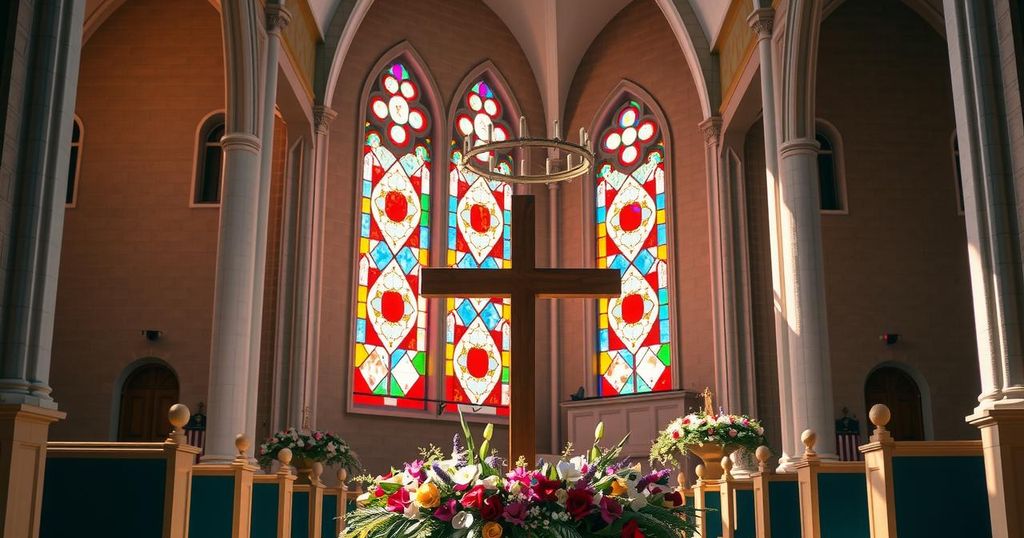DR Congo Bishops’ Secretary General Faces Government Scrutiny Over Swahili Speaker Discrimination Warning
Monsignor Donatien Nshole, representing the DR Congo bishops’ conference, was summoned by the government after denouncing discrimination against Swahili speakers following the M23 rebels’ takeover of Bukavu. The conference’s statement highlighted escalating violence against this linguistic group. Minister Jacquemain Shabani sought evidence for these allegations during their discussion. Amid political tensions, conflicts intensify in North Kivu with increasing civilian casualties.
Monsignor Donatien Nshole, the Secretary General of the Bishops’ Conference of the Democratic Republic of the Congo (CENCO), faced government scrutiny after issuing a warning regarding discrimination against Swahili speakers following the M23 rebels’ capture of Bukavu. On March 6, he was questioned at the Ministry of the Interior concerning a statement from CENCO denouncing increased hostilities towards Swahili speakers in Kinshasa and other regions of the nation.
During his meeting with Congolese Interior Minister Jacquemain Shabani, Monsignor Nshole described it as a constructive exchange focused on the country’s pressing issues. The minister had requested justification for allegations surrounding discrimination, hatred, and violence against citizens based on their ethnicity, language, or appearance. This dialogue aimed to bridge gaps in understanding and facilitate future cooperation.
CENCO raised concerns in a statement dated February 22, signed by Monsignor Nshole, highlighting stigmatization against Swahili speakers after the M23 rebels’ incursion. This was exacerbated by controversial comments from President Félix Tshisekedi, who, at the Munich Security Conference, accused former President Joseph Kabila of orchestrating the M23 unrest. This allegation incited threats and hostility on social media towards Swahili speakers, a consequence of the ethnic division linked to Kabila’s background.
The statement from CENCO urged action to thwart the rising violence based on linguistic identity and implored the government to safeguard the populace against these dangers. The bishops’ conference firmly criticized the discrimination and called for governmental responsibility in fostering social harmony.
Minister Shabani’s summoning of Monsignor Nshole is seen by some as necessary for addressing formal complaints from a significant institution such as CENCO. Political sociologist Prof. Tony Kanyinda posited that under an existing agreement, such matters should be discussed with the Ministry of the Interior, avoiding potential misinterpretations of harassment that could arise from judicial summons.
Nonetheless, some view this summons as an intimidation tactic towards Monsignor Nshole, particularly given his roles in peace initiatives promoting dialogue with M23. Recently, a delegation of Christian leaders sought an audience with President Tshisekedi to present findings related to the conflict. Government spokesman Patrick Muyaya expressed hope for a forthcoming meeting with the President.
Amid these developments, fighting has escalated in North Kivu province, specifically in Masisi territory, as clashes between the Congolese Armed Forces and M23 rebels continue. Local sources report casualties among civilians and significant displacement as the conflict unfolds, highlighting the precarious situation in the region.
The situation in the Democratic Republic of the Congo remains tense, particularly following the government’s response to criticisms concerning discrimination against Swahili speakers. Monsignor Donatien Nshole’s summons illuminates the complex interplay between government actions and civil society’s worries about ethnic tensions. As confrontations between armed forces and rebels escalate, the need for dialogue and peace-building initiatives persists. The bishops’ call for governmental responsibility reflects broader societal concerns for social cohesion in the face of ongoing strife.
Original Source: international.la-croix.com




Post Comment